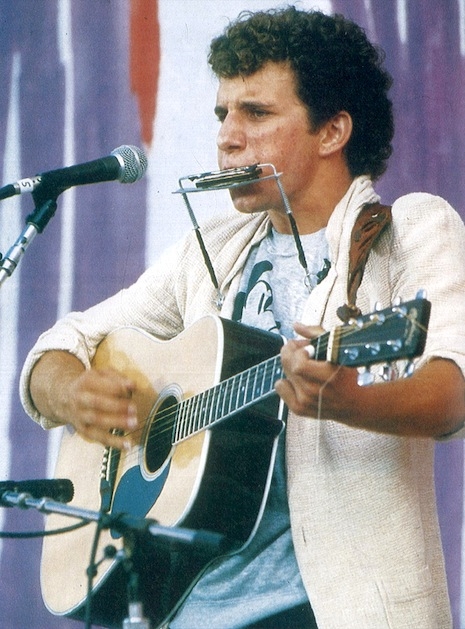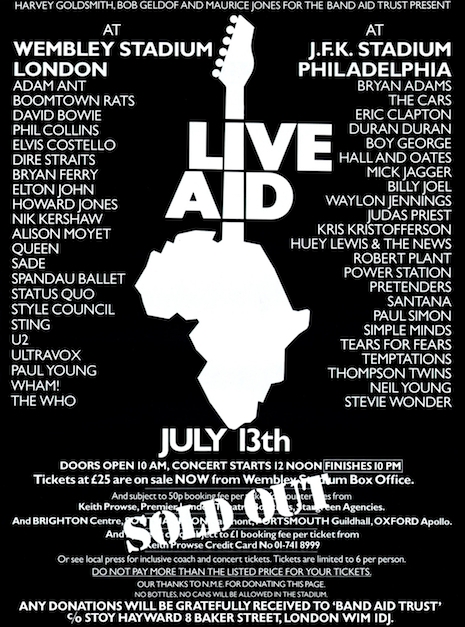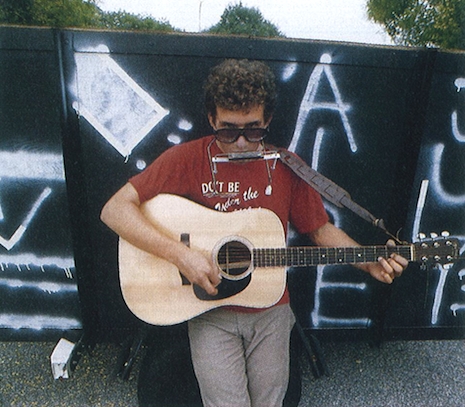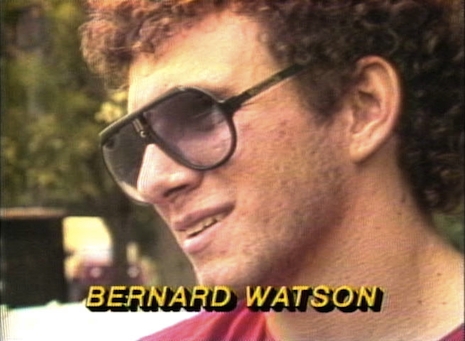
On July 13th, 1985, Live Aid, the largest concert event ever staged, was held. Taking place at stadiums in both London and Philadelphia, the charity concerts were broadcast to a global audience. The performers, some of the biggest rock and pop stars of the day, helped raise millions of dollars for the starving people of Ethiopia. Amidst this massive event, filled with star-studded performances and reunions of rock royalty, is a small story about a kid from Florida, who through sheer determination found himself on stage in Philadelphia, opening Live Aid.

David Weinstein was eighteen years old and had recently graduated from Miami Beach Senior High School when he took a trip during the summer of 1985. Leaving with his acoustic guitar, a Texaco gas card, and not much else, David made his way northeast in his Oldsmobile. He visited friends in Maine and New Jersey, though the main purpose of his trip was to travel to Pennsylvania to try to convince Bill Graham, the legendary concert promoter and organizer of Live Aid in Philadelphia, to let him on the bill. David attempted to achieve such a seemingly impossible goal simply because he liked the idea of the concerts and wanted to be a part of it. Before he left, he recorded a demo tape of a few of his original songs at his school’s studio. As the tape started rolling, David uttered these words: “Dear Mr. Graham, I would like to begin the Live Aid concert in Philadelphia with this song.” Doug Burris, David’s music teacher, who was recording the session, picks up the story:
I asked him what was going on and he informed me that that’s exactly what he was going to do. Knowing that David was a little unorthodox, spontaneous and driven, I did not ask any further questions, said ‘Ok,’ and finished the session.
One of David’s songs, “Interview,” includes the line, “I’m going to get lucky or I’m going to die trying.”

David waits for his big break.
I recently spoke with David, and he told me that he arrived at JFK Stadium in Philadelphia ten days before Live Aid would take place, looking for Bill Graham. He managed to worke his way into to the area where the stage was being built, and it was there that he spotted Mr. Graham. “That’s Bill Graham,” he said to himself, “That’s the man I came to see.” Unsurprisingly, Graham asked him who he was and what was he doing there. David explained his intentions and handed over his demo tape. A day or two later, Graham came out to the parking lot where David was camped out in his car. Graham said he liked the material, but that David’s singing and guitar playing needed work. Undeterred, David asked if he could play for him, right there in the parking lot. Graham left, but a few hours later, someone brought a prime rib dinner out to him—surely a good sign. Graham came out again, this time bringing along a reporter from Rolling Stone, and David played Bob Dylan’s “All I Really Want To Do.” Afterwards, Graham said, “I’ll get back to you.” Incredibly, David did indeed get the nod from Mr. Graham, and would kick off the U.S. edition of Live Aid. When David called Mr. Burris to tell him that it was actually happening, his music teacher didn’t believe him and advised that he see a psychiatrist. But David wasn’t delusional, and soon Mr. Burris and members of the Weinstein family were on their way to Philadelphia.

On the morning of July 13th, Live Aid began at Wembley Stadium in London. It was 7:00 a.m. in Philadelphia, and attendees at JFK watched the concert on the mammoth screens inside the venue. David Weinstein waited in the wings for his moment to begin. He was understandably nervous. When given the two-minute warning, he was behind the stage curtain, watching people run in every direction, with photographers situated all around—it was then that he started to get overwhelmed. Fittingly, it was Bill Graham who introduced David, the first performer of the day in Philadelphia: “We thought we’d give him a shot, and let’s help make his dream come true.” With that, David came out to see a sea of faces—approximately 100,000 of them—starring back at him. At 8:51 a.m., armed with just an acoustic guitar and a harmonica, he started playing his original composition, “Interview,” but nerves got the best of him. “I came on out and just blew the whole thing (laughs).” When I say it can’t be as bad as he portrays it, he laughs again and says, “You don’t know. I’m uncomfortable just thinking about it, and I haven’t thought about it in a while.” With shaky knees, he made his way through “Interview,” selected because he felt the lyrics were pertinent (though he now wishes he played “All I Really Want To Do”), but he picked a key that didn’t really suit his voice, and during the forth or fifth stanza of this rather lengthy song, he played a bum note that still bums him out to this day. He also dropped a pick and broke a string. After less than ten minutes, it was time for David to make his leave, and he walked off stage and into history. David calls his performance “a disaster,” though he notes the crowd “reacted in a warm way,” and he was thankful then—and still is today—to Bill Graham for giving him his shot.
Before the event took place, David decided he needed a stage name. “Jewish dudes, we have to change our names for some reason.” He came up with “Bernard Watson” by combining two characters from Aldous Huxley’s novel, Brave New World—Bernard Marx and Helmholtz Watson—chosen because the characters are, as he put it, “diametrically opposed.” Though “Bernard Watson” is now the name he’s forever associated with, he admits, “I’ve never been comfortable with it, nobody calls me that. It’s Dave Weinstein—or get the hell out!”

A news crew from a Miami TV station was in Philadelphia to film a “local boy makes good” type segment. The raw footage they shot included, thankfully, David’s entire performance, as, for reasons unknown, none of the major networks on hand had cameras rolling. There is a clip online, but it only lasts thirteen seconds and an announcer is heard talking over it. David has the complete footage, though he says he hasn’t watched it in years. The tape currently sits in a box in his parent’s garage.
After the adrenaline ceased flowing and the initial disappointment faded, David was on cloud nine after Live Aid. In the weeks that followed, he traveled overseas with not much of a plan. Upon returning, he ran into a girl he knew from high school who introduced him to psychedelics. He admits he “kind of went in and out of it” for a while, but later on he became a father. Happy to “just be a daddy,” he raised a boy who has recently gone off to college. All the while, David continued writing. He’s spent the last two-and-a-half years compiling three decades worth of songs and literature he’s written, which he’ll unleash on the world very soon.
Naturally, his Live Aid set has followed him all these years. “Every morning I get up out of bed, I know I’m the kid who opened Live Aid. I have to confess that. It becomes part of your ego, until you’re so tired of it…Life gets in the way—thank goodness.” Which isn’t to say he’s not grateful for both that experience, as well as the totality of his existence. “So many good things have happened in my life. I have a lot to be thankfully for. Live Aid was huge to me.”
Due to the wishes of the YouTube user who uploaded the short clip of David at Live Aid, we can’t include it here, so instead we’ll feature David’s favorite moment as a spectator at the concert. For him, the highlight was sitting in the audience with his teacher, Doug Burris, just a stones throw from the stage, watching Neil Young sing “Sugar Mountain.”